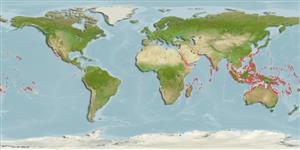Common names from other countries
>
Ovalentaria/misc (Various families in series Ovalentaria) >
Pomacentridae (Damselfishes) > Microspathodontinae
Etymology: Plectroglyphidodon: Greek,plektron = anything to strike with, spur + Greek, glyphis = carved + Greek, odous = teeth (Ref. 45335).
More on author: Bleeker.
Environment: milieu / climate zone / depth range / distribution range
Ecologia
marinhas associadas(os) a recifes; não migratória; intervalo de profundidade 0 - 6 m (Ref. 9002). Tropical; 30°N - 30°S
Indo-Pacific: Red Sea and East Africa to the Marshall and Pitcairn island groups, north to Japan, south to Australia.
Tamanho / Peso / Idade
Maturity: Lm ? range ? - ? cm
Max length : 12.0 cm TL macho/indeterminado; (Ref. 4391)
Espinhos dorsais (total): 12; Raios dorsais (total): 15-17; Espinhos anais 2; Raios anais : 12 - 13.
Adults inhabit surge-swept shorelines and seaward reef margins. Juveniles often occur in pockets of the intertidal reef crest, while adults are found in ridges between surge channels (Ref. 1602). Feed on benthic algae. Juveniles found in sheltered ocean bays, shallow low boulder-reefs above sand level. Known in clear-water reefs in gutters and upper edge of drop-offs (Ref. 9002). Oviparous, distinct pairing during breeding (Ref. 205). Eggs are demersal and adhere to the substrate (Ref. 205). Males guard and aerate the eggs (Ref. 205). Diurnal species (Ref. 54980; 113699).
Ciclo de vida ou comportamento de acasalamento
Maturidade | Reprodução | Desova | Ovos | Fecundidade | Larvas
Oviparous, distinct pairing during breeding (Ref. 205). Eggs are demersal and adhere to the substrate (Ref. 205). Males guard and aerate the eggs (Ref. 205).
Randall, J.E., 1995. Coastal fishes of Oman. University of Hawaii Press, Honolulu, Hawaii. 439 p. (Ref. 11441)
Status na Lista Vermelha da UICN (Ref. 130435)
CITES (Ref. 128078)
Not Evaluated
Ameaça para os humanos
Harmless
Uso pelos humanos
Pescarias: sem interesse; Aquário: Espécies comerciais
Mais informação
ReferênciasAquaculturaPerfil para aquaculturaEstirpesGenéticaElectrophoresesHereditariedadeDoençasProcessamentoConversão de massa
Ferramentas
Relatórios especiais
Baixar XML
Fontes da internet
Estimates based on models
Preferred temperature (Ref.
115969): 24.7 - 29.3, mean 28.3 (based on 3089 cells).
Índice de diversidade filogenética (Ref.
82804): PD
50 = 0.5010 [Uniqueness, from 0.5 = low to 2.0 = high].
Bayesian length-weight: a=0.01950 (0.00922 - 0.04124), b=3.00 (2.82 - 3.18), in cm Total Length, based on LWR estimates for this (Sub)family-body shape (Ref.
93245).
Nível Trófico (Ref.
69278): 2.0 ±0.00 se; based on food items.
Resiliência (Ref.
120179): Elevada, tempo mínimo de duplicação da população menor que 15 meses (Preliminary K or Fecundity.).
Fishing Vulnerability (Ref.
59153): Low vulnerability (10 of 100).
